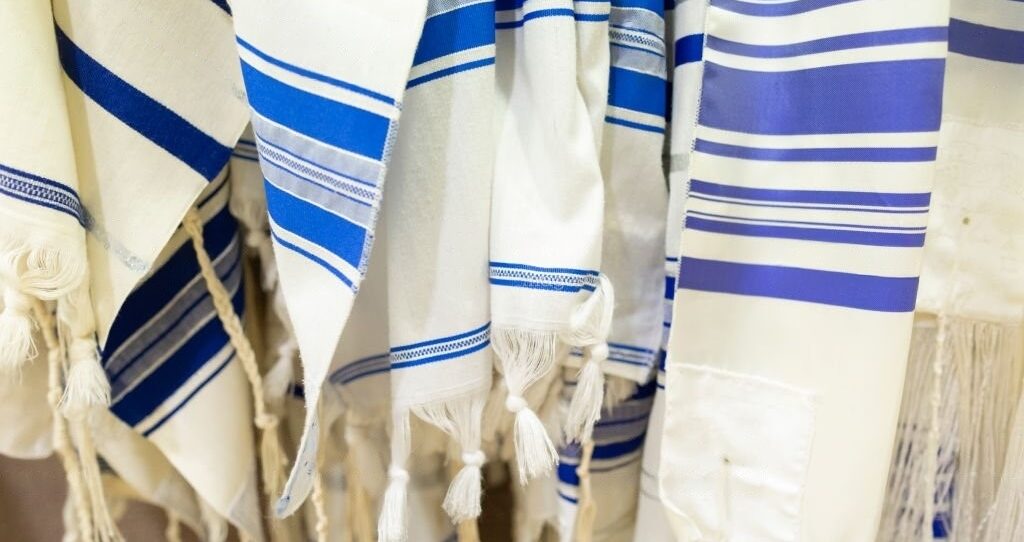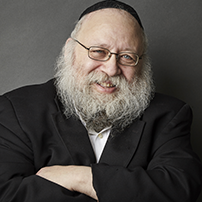
Korach’s Challenge
Korach, Moses’ cousin, started a rebellion, directed against Moses and Aaron. Korach argued that Moses had arrogated to himself and his brother Aaron their exalted roles of leadership. In Korach’s words:
“It is too much for you! For the entire assembly – all of them – are holy and G-d is among them; why do you exalt yourselves over the congregation of G-d?”
According to the Midrash, Korach cited the Mitzvah of tzitzis – mentioned at the end of last week’s parsha – to buttress his argument that Moses’ leadership position was superfluous:
“Korach sprung up and said to Moses, ‘A cloak that is made entirely of techeiles [a special blued dye], should it be exempt of tzitzis?’
Moses said to him, ‘It is obligated in tzitzis.’
Korach retorted, ‘If a cloak that is made entirely of techeiles does not exempt itself [from the techeiles requirement], then do just four threads [of techeiles] exempt it?’”
Commentators explain that Korach’s argument was that Moses’ role was entirely unnecessary, for if his mission was to bring holiness to the Jewish nation, they were already holy. Just as, in his opinion, there is no need for techeiles threads if the entire talis is made of techeiles, so too the Jewish people, who are like techeiles in terms of their holiness, do not need one person (Moses) to exalt above them and instill holiness in them..
Two Sources
What was the crux of the argument between Moses and Korach?
The following is partially based on the work Yad Dovid (from the 17th and `18th century Rabbi David Oppenheim) who suggests that the issue as to whether the cloak made entirely of techeiles requires tzitzis hinges on the two reasons the Jewish nation merited to be given the Mitzvah of tzitzis:
The Talmud (Chulin 89a) attributes our meriting the Mitzvah of tzitzis to the virtue of the Patriarch Abraham who refused to benefit from the King of Sodom, whom he rescued:
“As a reward for our father Abraham’s having said: ‘If so much as a thread or a shoestrap… his descendants merited two Mitzvos: the thread of techeiles and the strap of Tefillin.”
The other source is from Midrash that ascribes the merit of the Mitzvah of the talis [with its tzitzis] to the virtuous act of Noah’s son Shem. On the verse [Genesis 9:23): And Shem and Yefes took a garment” [to cover their father] the Midrash comments:
“Shem began the righteous deed [of covering his father Noah’s nakedness] and Yefes came and heeded him. Therefore, Shem merited the talis [with its tzitzis] unlike Yefes who only merited the cloak [absent the Mitzvah of tzitzis].”
The work Yad Dovid explains that these two sources for the Mitzvah of tzitzis actually reflect two approaches towards theprimary objective of wearing tzitzis.
If the source of the Mitzvah is derived from the narrative of Shem covering his father with a garment, then the primary focus of the Mitzvah of tzitzis is the talis on to which the tzitzis are attached.
Conversely, if the source of the Mitzvah of tzitzis is Abraham eschewing taking even a thread from the King of Sodom, then the focus of the Mitzvah is on the Tzitzis.
Peripheral or Internal
We can now understand the divergent views of Korach and Moses and better understand Korach’s argument. [Yad Dovid approaches this matter from a totally different angle.]
The Mitzvah of tzitzis requires wearing a four cornered garment with tzitzis attached to it. These two components represent two modes of spiritual influence in our lives:
The talis which envelops us represents an external source of holiness that surrounds and embraces us, but does not penetrate and permeate us. It is the kind of influence that we receive when we live in a wholesome, spiritual environment. This influence protects us from the hostile influences, by rendering us impervious to them, much like armor that protects us from harm. The talis, however, does not enter into our consciousness to change us; it is strictly a peripheral force.
We all have imperfections and negative energy; we are naked and spiritually vulnerable, analogues to the state of Noah’s nakedness. The way to address this vulnerability is by enveloping ourselves with an aura of holiness. Even if we are not on a spiritual journey, just by being wrapped in holiness suffices to prevent us from faltering and degenerating.
The tzitzis, on the other hand, represent, the differentiated, internalizing channeling of spirituality into our lives. While not affording us protection from the outside it reinforces our inner strength.
Korach was a believer in the talis oriented aspect of the Mitzvah of tzitzis. He maintained that one did not need a Moses figure to nurture the people because the entire nation had been embraced by G-d at Sinai. Our Sages tell us that G-d placed Mount Sinai over our heads at the time He gave us the Torah. This is interpreted to mean that G-d showered and embraced us with His love. At Sinai G-d wrapped the Jewish people in a talis of Divine light.
To be sure, Korach recognized the importance of inner spirituality, but he believed that the Jewish people already possessed that internal holiness. In Korach’s words: “G-d is within them.” Even the most estranged Jew possesses a divine soul and the essence of the soul cannot be sullied. So Korach reasoned, between the inner holiness of the Jew and G-d’s talis, His enveloping light, there would be no need for Moses to nurture them.
Korach was wrong. To be enveloped in holiness, augmented by one’s inner spark of holiness, does not suffice. We need to constantly reinforce and nurture our holiness, so that the inner spark does not remain dormant. Therefore, Moses argued that no matter how holy one is peripherally by being totally enveloped in the powerful aura of a talis made entirely of techeiles, it does not suffice. One needs the internalizing energy of the tzitzis. One can also not rely on our inner holiness because that holiness has to be brought to our conscious mind and heart by constant nurturing.
Moses, was therefore chosen by G-d to undertake this task for the people. Moses was therefore called the Faithful Shepherd not only because he was a faithful leader but also because he was the ultimate shepherd of faith. Moses nurtured the Jewish people’s inner spirituality.
Lesson for Today
The lesson for today is that in order for us to raise spiritually healthy children we can’t rely solely on living in a good Jewish environment; in an atmosphere saturated with holiness. While that is certainly necessary, it is even more crucial that we have concentrated and differentiated guidance for our children. If we want to protect our youth from the depraved moral influences of the modern day Kings of Sodom, we must focus on proper moral and spiritual education that reaches every person internally. We must ensure that the teachings of Torah that we impart to them are conveyed in a nurturing way that connects to and resonates with the child.
The Challenge of Galus
Tragically, Galus has taken a toll on both the talis model and tzitzis model of spiritual influence. G-d’s overarching presence that enveloped us at Sinai is concealed and the insidious negative influences in our society today demand that we work overtime to counter those influences.
This will all be corrected with the coming of Moshiach. Moshiach. Like Moses, will fuse the two paradigms of talis and tzitzis. We will bask in the most powerful and unprecedented G-dly light. In the words of our Talmudic Sages: “G-d will take the sun out of its sheath and the righteous will bask in its light.” But, at the same time, Moshiach will nurture us individually by helping us internalize the light and fully expose our soul’s essence.


